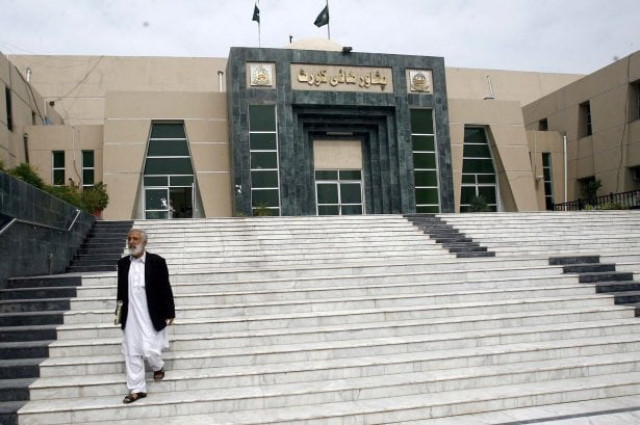Filled seat: Presidential elections challenged
Petitioner contends elections for the seat can only be held when it is vacant

Peshawar High Court. PHOTO: FILE
In a petition filed in the Peshawar High Court (PHC), Shahid Orakzai claims that the elections cannot be held since there was currently no vacancy in the office of president since the tenure of the incumbent lasts until September 8 while the election for the next president has been scheduled for September 4.
The petitioner, Orakzai, who regularly files petitions in the court, asked whether the Constitution allows ballots for this highest position of the country in the last 30 days of the president’s term in the office?
Orakzai urged the PHC to stop the presidential elections, contending that Article 41 of the Constitution does not allow elections in the last the 30 days of the incumbent’s term.
Clause 5 of the article 41 provides that an election to fill a vacancy in the office of president shall be held not later than 30 days from the occurrence of the vacancy provided that if the election cannot be held within the period aforesaid because the National Assembly is dissolved, it shall be held within 30 days of the general election to the assembly.
The petitioner added that clause 5 of article 41 of the constitution can be invoked strictly when the office of president falls vacant owing to death, resignation or removal from office.
He went on to say that the incumbent president is hale and healthy and does not appear to have any intentions of resigning and his tenure is scheduled to expire on September 8 so the question arises how the election commission of Pakistan can organize the election under clause 5?
He named the Election Commission of Pakistan (ECP) as a respondent in the case.
Process of governor’s oath-taking challenged
The top lawyers of the federal and provincial governments have been directed to assist the court in deciding on a writ petition challenging the procedure of the provincial governor’s oath-taking ceremony.
The directions were directed as a two-judge bench of the Peshawar High Court (PHC), comprising Justice Qaiser Rashid Khan and Justice Nasir Mehfooz, heard earlier this week a writ petition which had been filed by lawyer Shabbir Hussain Gigyani.
Gigyani urged the court to restrain the state from conducting the oath-taking ceremony for future governors at the Governor House. Instead, he suggested that the nominated governor must visit the High Court and take his oath before the chief justice.
The petitioner further argued that as per the actual interpretation of Article 102 of the Constitution, the oath-taking ceremony of governors must be held at the High Court before the chief justice and not at the Governor House.
“It is a question of supremacy and integrity of judiciary and law of the country,” Gigyani told the court.
“Relevant sections of the constitution, especially article 102, have been erroneously interpreted as it provides that the oath shall be taken before the CJ which proves that before entering the office, the governor shall appear in the high court to take the oath,” he said, noting that current procedure was contrary to this.
Referring to Article 194 of the Constitution, he said that the same non-compliance of the relevant constitutional provisions of is also in practice in the oath taking of president of the country as per Article 42 of the Constitution.
“Reliance has been placed on the corresponding article 60 of the Indian constitution of 1949 without taking into consideration the grounds of supremacy, integrity, and independence of judiciary and law of the country,” the petitioner told the court.
As Interim relief, the petitioner requested the bench to grant a stay on the oath-taking ceremony of the new governor of the province, who is expected to take oath on September 4.
Published in The Express Tribune, August 31st, 2018.













COMMENTS
Comments are moderated and generally will be posted if they are on-topic and not abusive.
For more information, please see our Comments FAQ